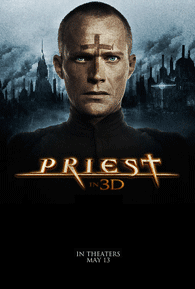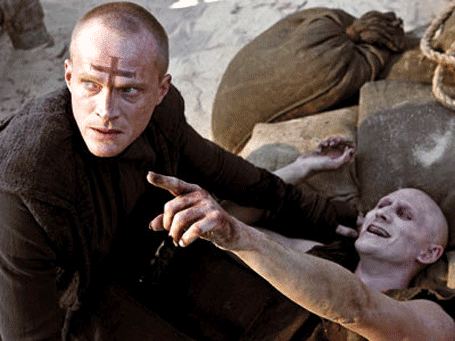
Before attending this movie, manga and manhwa fans should not be deceived by the credit to Min Woo Hyung’s complex and sprawling manhwa series that written for an Asian readership, imbues the same sinister undertones to Judeo-Christianity that American and European pop culture imbue to non-Abrahamic religions. Probably due to its content being perhaps overly sacrilegious for American Bible Belt audiences, the adaptation of Priest is one in name only.
In fact, there’s a good bet that the script for Priest was an outer space adaptation of John Ford’s 1954 Western The Searchers , with the film’s ‘vampires’ (basically some sort of eyeless, hive-dwelling creature) as a substitute for the original film’s Native Americans. Think of the tropes that Priest shares with a classic Western. In the post-apocalyptic wasteland world of Priest (read: “Texas”), the Priests (read: “Texas Rangers”) are a special force that patrol a wasteland on the lookout for the ‘vampires’, while humans that received vampire bites and now serve them as “familiars” (read: “white settlers and trappers who intermarried with Native Americans/resettled Native Americans”) reside on special “Reservations”. The last free ‘vampires’ (read: “Geronimo and his warband”) are however planning a final rampage to destroy mankind (read: “rid Texas of white settlers”) with the aid of a mysterious presence known in the credits as “Black Hat” (Karl Urban). Yes, the last one is not a joke. It’s so much a horse opera that the villain is named “Black Hat” (after the trope that classic Western bad guys often wore black hats and heroes white hats.)
That is not to say that the protagonist, a former warrior priest (Paul Bettany) whose niece was kidnapped by the ‘vampires’, fares any better when he is simply named ‘Priest’ and his female counterpart (Maggie Q) is simply named ‘Priestess’. The fact that a significant number of characters in the film are not named may be the film’s best artistic decision because all the characters in this movie are too dull to need names, even the ones with names. Priest’s law enforcement sidekick (Cam Gigandet) might as well be named “Sheriff” and likewise the priest’s niece (Lily Collins, daughter of Phil and to be seen in the forthcoming teen thriller Abducted) should just be named “Girl”.
Such a film might have been more fun if it had a sense of humour about itself, after all, the pioneers of the Spaghetti Western, such as Sergio Leone and Sergio Corbucci, were very funny men even if their films are today known for their aesthetically rendered violence, and their sense of humour, mordant as it might be, was a huge factor in the success of their films. But such humour is not to be found in the literal and figurative wastelands of Priest. Everyone seems to not be so much acting as going through the motions, even Black Hat when he dances to the Mozart Requiem’s Dies Irae in a John Woo moment. Not even veteran character actor Brad Dourif (of such villainous roles as Grima Wormtongue from Lord of the Rings and the voice of killer doll Chucky no less) manages to do much with the role of the snake oil salesman. (A role that is indeed referred to in the credits as ‘Salesman’.) On the plus side, Scott Stewart can shoot and frame a scene, but that is of little use in particular, when Stewart cannot make you believe anything, even if it’s probably and largely not his fault.
Priest is one of those films that’s worth watching if only because it never draws you in from almost the first frame, followed by an overlong animated intro apparently tacked on just to make the story barely comprehensible and worth caring about. Outside of this ‘voyeuristic value’, though, Priest is a dreadfully dull vampire Western that disappears in the light of the sun once you step outside the cinema hall.

